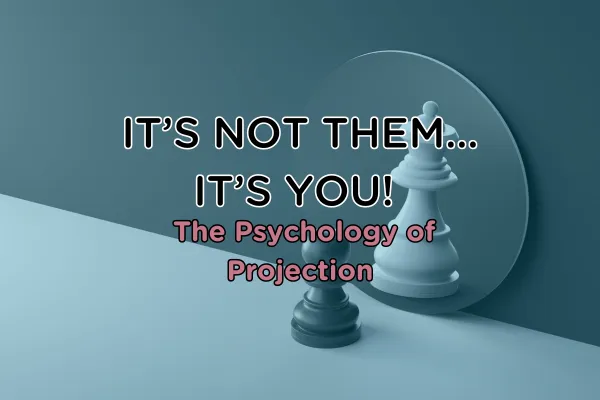General Inquiries: (587) 333-6349 - info@sanostate.com



It’s Not Them… It’s You! The Psychology of Projection
“...we still don’t understand the brain and human mind very well, which makes it all even more intriguing to know that there is so much more to learn! ” - Kayla Taylor
Have you ever heard of the idea that you can be bothered by things in others that are actually issues you exhibit yourself?
It’s called projection, and it is a defense mechanism that was first illuminated by Sigmund Freud, who is considered to be the father of psychology himself (and later his daughter Anna Freud, who defined the defense mechanisms in more detail).
Sigmund Freud was a brilliant neurologist who is known as the founder of psychoanalysis—a major foundation and stepping stone for psychology as we know it. In my opinion, some of Freud’s concepts were a little far out, and if you are aware of his work, you will know exactly what I am talking about.😜 However, many concepts are very helpful in modern psychology, even if you aren’t such a fan of psychoanalysis itself.
For instance, in today’s world, how often do you hear and continue to utilize terms and concepts such as denial, repression, or regression? What I really appreciate about defense mechanisms is that they have an element of truth and functionality, even today!
Let’s take a look at why.
First, we have to examine Freud’s notion of the three components of the self:
The “Id” (the primitive, unconscious, and often automatic parts of self)
The “Ego” (the conscious and unconscious part of self that helps keep the impulses of the Id in check)
The “Superego” (the rules-oriented, pleasing, part of the self, established through parental and larger societal figures; it is also conscious and unconscious and often thought of as one’s moral compass or conscience – not to be confused with the level of consciousness).
I have always been fascinated by the unconscious mind, which is what drew me to psychology to begin with. What happens under the surface, even deeper than what we know to be occurring?
It’s very hard to define the unconscious mind, how it operates, and its impact on our thoughts, feelings, actions, and personality. There’s something about it that seems to defy reality, logic, or science at times. What is more captivating than that?!
That is why I gravitated to Neurofeedback (NF) therapy as a treatment modality. Often, we work with the unconscious mind during NF; as stated in a previous blog "Unlocking Your Brain's Potential: The Power of Neurofeedback Therapy", the mechanism of change is often implicit vs. explicit, though it can be made more explicit if helpful.
But back to projection… I think Freud’s theory of Id, Ego, Superego and defense mechanisms was a solid start to understanding what might be underlying the complexity of our minds! And let’s be honest, we still don’t understand the brain and human mind very well, which makes it all even more intriguing to know that there is so much more to learn! What Freud posited was that the Ego was the facilitator between our Id and Superego and (consciously and/or unconsciously) protected our own psyche from harm by engaging in defenses that served to protect us (psychologically speaking). So when we experience discomfort, for example because something is amiss with our value system or the way that we are thinking, feeling, or engaging in the world, we will project our own proverbial sh*t onto others (instead of noticing it in ourselves, because that would create shame, for example). Instead, we begin noticing, and even focusing on, these very characteristics in everyone but ourselves!
How interesting… so we preserve our own self-esteem (and ego) in order to avoid anxiety, fear, humiliation, shame, and so many other BIG feelings. It makes sense when you think of it this way and there isn’t anything inherently wrong with having these defenses. In fact, they are a real protective mechanism in some cases. Think about a traumatized individual, in which they may exhibit a number of defense mechanisms in order to ‘survive’ the devastating event(s) that they are (often helplessly) subjected to.
So what does all this mean?
Perhaps it serves as a reminder to take a look inward and consider if you may be projecting (or engaging in any other defense mechanism, which you can look up and read about if interested).
If you find that you are, it may draw awareness to a thought, feeling, or behaviour pattern that you actually might benefit from recognizing in order to consider what might serve you better.
If you or a loved one would like support in this area, please get in touch with us HERE or call at 587-333-6349. 💙
Disclaimer
Our content is for informational and educational purposes and is not a replacement for professional advice, diagnosis, or treatment. If you're facing mental health concerns, please seek help from a qualified professional for personalized guidance. Every individual's situation is unique, so use the information here at your discretion. While we strive for accuracy, the field of psychology is ever-evolving, and our content may not always reflect the latest research. Please prioritize your privacy by avoiding sharing personal information in comments or interactions. Your well-being is our top concern, so use our content for educational purposes, but remember to rely on professionals for your specific needs.
References
Bailey, R., & Jose, P. (2023, May 22). Defense mechanisms. StatPearls [Internet]. https://www.ncbi.nlm.nih.gov/books/NBK559106/
Cherry, K. (2024). Id, Ego, and Superego: Freud’s Elements of Personality. verywellmind. https://www.verywellmind.com/the-id-ego-and-superego-2795951
General Inquiries:
Our Locations:
Additional Resources:
About Us:
We strive for excellence in psychological treatment. We are committed to providing professional, caring, innovative, and research-based services.
© 2024 Sano State Taylored Psychology. All Rights Reserved.

